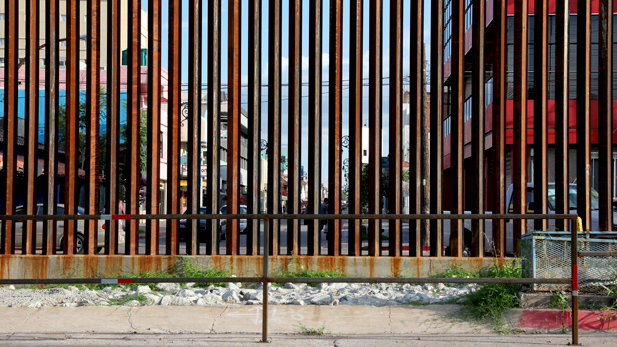 Nogales Sonora in Mexico as seen through the international border fence
Nogales Sonora in Mexico as seen through the international border fence Listen
Undocumented immigrants have been climbing the international border fence for years, many with the help of smugglers who set up ladders. A shelter in Mexico and the Mexican consulate say recently there has been an increase in serious injuries along the fence.
Three women were recovering from fractures to their feet, legs and spine at a migrant shelter in Nogales Sonora last week. All were injured after falling from the border fence.
“The smugglers set up a ladder for me on the Mexican side, they make you go up and then you have to find a way to get down,” a woman at the shelter said. “I couldn’t figure it out, my feet were sliding down the tubes, I got stuck and then fell.”
The woman, from Oaxaca Mexico, spent 20 days at the shelter recovering from fractures to her legs and spine. She did not want to be identified out of fear for her life because of connections between smugglers and drug cartels.
She said she was on the ground unable to move for about two hours.
“I wanted to die, I wish I had died because I couldn’t handle the pain,” she said. “My hope was to cross, go to Los Angeles, get a job and be able to pay for an education for my daughter in Mexico because I wanted her to be someone in life.”
Border Patrol agents saw her “took care of me, gave me water and then called an ambulance.”
She was taken via helicopter to a Tucson hospital where she had multiple surgeries, she said. Another woman at the shelter, 28-year-old Maria Consepcion Ibarra Perez, said she also was taken to a Tucson hospital where she had surgery to repair a broken leg.
Area hospitals end up responsible for much of the costs associated with treating these border crossers, but none keep track of how many or of the cost.
“As a nonprofit hospital, Tucson Medical Center is committed to providing care for all patients who come to us in need, regardless of race, religion, income or any other characteristics,” a spokesperson said in a statement. “In 2014, TMC provided $13.6 million in uncompensated care costs, which includes charity care, bad debt and discounts for the uninsured.”
Holy Cross, which is in Nogales, Ariz., gets a lot of the injuries that happen on the border. When the migrants have traumatic injuries, for instance, they get transported to Tucson. A hospital spokesperson referred all questions about the hospital's expenses and number of people they treat to the Border Patrol.
Border Patrol declined an interview for this story, but said in a statement when an agent "encounters a person who has suffered an injury, providing care for that person is the number one priority. Agents will assess the situation and call for additional medical services if needed."
Although the agency tracks the number of migrant rescues it does not keep track of falls from the fence, the statement said.
Soon after the migrants have surgery they are likely repatriated and many end up at shelters in Sonora.
In June, more than 30 injured people were dropped off at the Juan Bosco shelter for migrants in Nogales, Sonora, said Gilda Felix, the shelter’s director. So far in 2015 the number exceeds 200, she said.
Most of them are women and their injuries are fractures to their feet, ankles or legs.
“They think it’s easier than walking for days in the desert but it’s not,” Felix said. “It’s the same crossing through the wall or through the desert, both difficult and dangerous.”
The Mexican consulate in Tucson has had more migrants in need of medical attention from falling off the border fence than from crossing the desert.
There have been 37 cases of injured Mexican migrants in 2015, said Ricardo Pineda, consul of Mexico in Tucson. In 2014 his office reported 56 cases. That includes all injuries not just falling from the fence, he said.
For Ibarra Perez who was also recovering from a fracture at the shelter, this was her last attempt at crossing into the U.S. illegally.
She has 10-year-old son who is a U.S .citizen, born in South Carolina, and has health problems, she said.
"I feel defeated, I feel bad, not so much because of what happened to me because I know it will pass, but I hurt for my son because he has hopes in me to get back into the U.S."
The Mexican government arranged for Ibarra Perez and the unidentified woman to be flown back to their native state of Oaxaca in southern Mexico Tuesday.
Pineda said Mexican health officials will continue caring for the women in Oaxaca.
This story was reported in collaboration with Perla Trevizo of the Arizona Daily Star.

By submitting your comments, you hereby give AZPM the right to post your comments and potentially use them in any other form of media operated by this institution.